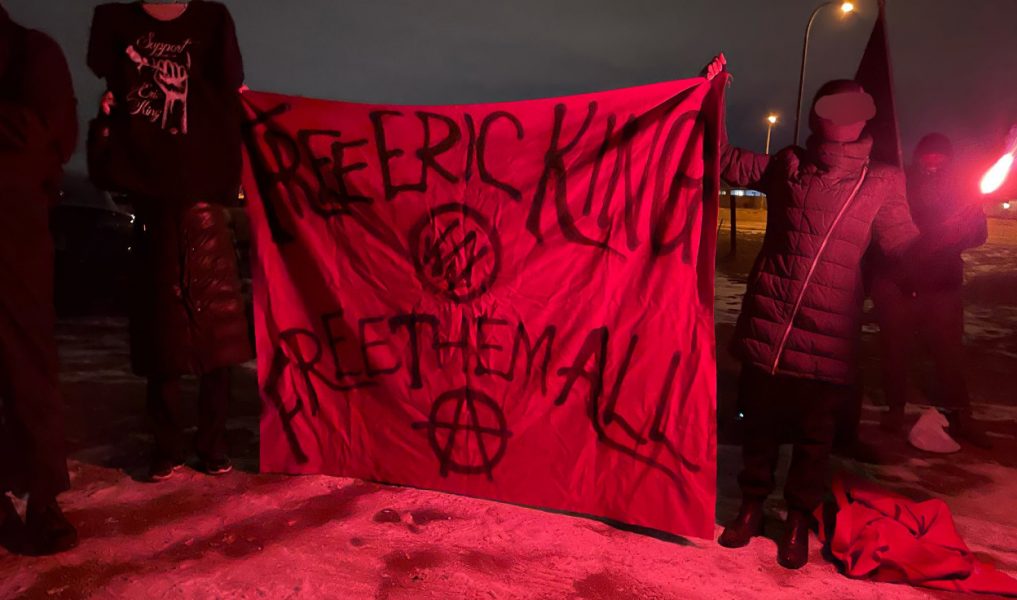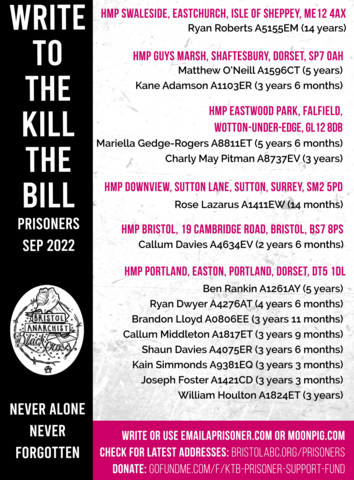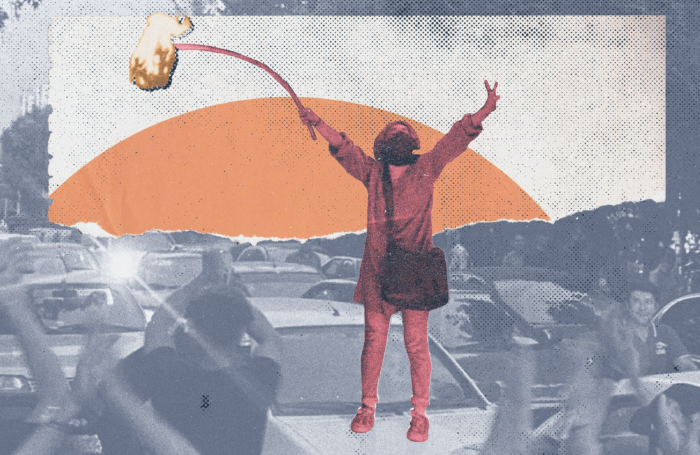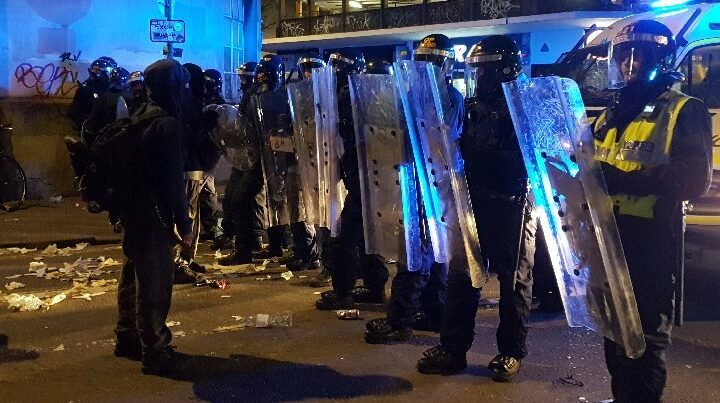Via It’s Going Down
An interview with anarchist political-prisoner Eric King with the Seattle-Tacoma chapter of Black and Pink.
In this time when authorities refuse to keep people safe from COVID-19, when rebellion is a fresh on our minds, and when the abolition of police and prisons is becoming a clear necessity to more and more people, we’ve got something to learn from an anarchist political prisoner like Eric King. Eric vandalized the office of a government official in Kansas City, MO, in solidarity with the Ferguson uprising, was arrested in September 2014, and then was sentenced to ten years for the window he broke in June 2016. Such a sentence is horrible, but not shocking. Prisons, after all, do more to keep hierarchies safe than people.
Eric is now facing a bogus charge of assaulting an officer that could land him another 20 years inside. At the time of writing this, he has been hit with a mail restriction and can’t receive letters of support. But we can make ourselves aware of his case and learn from his words.
The following is an interview with Eric conducted through snail mail by the Seattle-Tacoma chapter of Black and Pink, a queer/trans abolitionist group that focuses on building community across prison walls.
Black and Pink Seattle-Tacoma: How would you characterize FCI-Englewood’s response to COVID-19?
Eric King: Dreadful! At least in the SHU. People were brought in without being tested, staff was never tested. Our tiers were not cleaned more than once a week, we were only given 3 showers a week. No bleach was used anywhere. We were given masks, but staff/admin was so slack with their usage. Now we have a massive outbreak. The entire SHU was ill and staff refused to acknowledge or test us, until on Thanksgiving when things were so bad a med officer had no choice but to test 3 of us… all positive. A few days later they test everyone else, ALL positives. Then, AFTER we all are very sick, they institute a SHU lockdown, they start bleaching the showers between use, etc. Warden Greilick failed. None of us have been given anything for it, not even info about symptoms and how to make it less. Greilick failed, 600+ cases, all preventable.
B&P: What’s something about being in prison that you feel like people outside don’t understand, and need to know? Were there expectations you had about prison that shifted once you were incarcerated?
EK: I’m not sure people realize or care about the amount of psych games these people play. It is violent. Withholding mail for weeks or months claiming you don’t have any, searching your cell and vandalizing your family photos. Placing you intentionally around people who wish to harm you. I’ve seen cops lie and tell a group a certain person is a rat just to get that person fucked up. Happens all the time and isn’t limited just to unit cops. Medical will see you on your death bed and say you just need more water. People die because of this gaslighting. You file your grievances as you’re supposed to and get told they never got filed, that YOU are lying. It’s a miracle there aren’t staff murders every day. Instead people internalize this bullshit and give up, or turn anger on fellow convicts instead of toward the system baring down on them. It’s an effective spirit breaker. I honestly thought in prison it’d be “us vs. them” … it isn’t… it’s us vs. us while they laugh and manipulate us. Devastating.
B&P: What do you notice about how different populations in the prison are treated? How has your position affected your treatment?
EK: Different groups get treated different for sure, usually to stir resentment and violence. Gay and transgender people get treated abysmally by all races/gangs AND staff. They are demonized and treated as less than scum, often left vulnerable to attack or staff harassment.
My position as an anti-racist / anti-fascist person has been used to create divisions and separation. At USP-McCreary while in the SHU, staff mocked my “Antifa” face tattoo and assured me they were going to get me jumped… and they did. Mail is ALWAYS horribly delayed and often arbitrarily rejected, email has to be read and approved before being sent out – which can take days. I’ve been denied phone calls for 2 years after a website posted about me and my wife was denied visiting access due to her “ideology.” Staff talks big shit trying to instigate violence, subject you to a large amount of searches and property confiscation… you get targeted.
B&P: What sustains you while you’re inside? What support are you getting that is really making you feel supported?
EK: The support that feels the “most,” is when people/groups do things outside of me, on their own. Things like banner drops, fundraising, getting writings or info published to various sources. Being kept relevant and alive. In the near future it will be trial support: either showing up, posting about it, encouraging others to come, things like that. I have an amazing family who is outlandishly loving and supportive, I am very present in their lives. I have great friends and supporters who look out for me super tough. These things sustain me. Also, I am very secure in myself. My ethics and my belief in myself, in my future. These things carry me throughout the day. They won’t beat me.
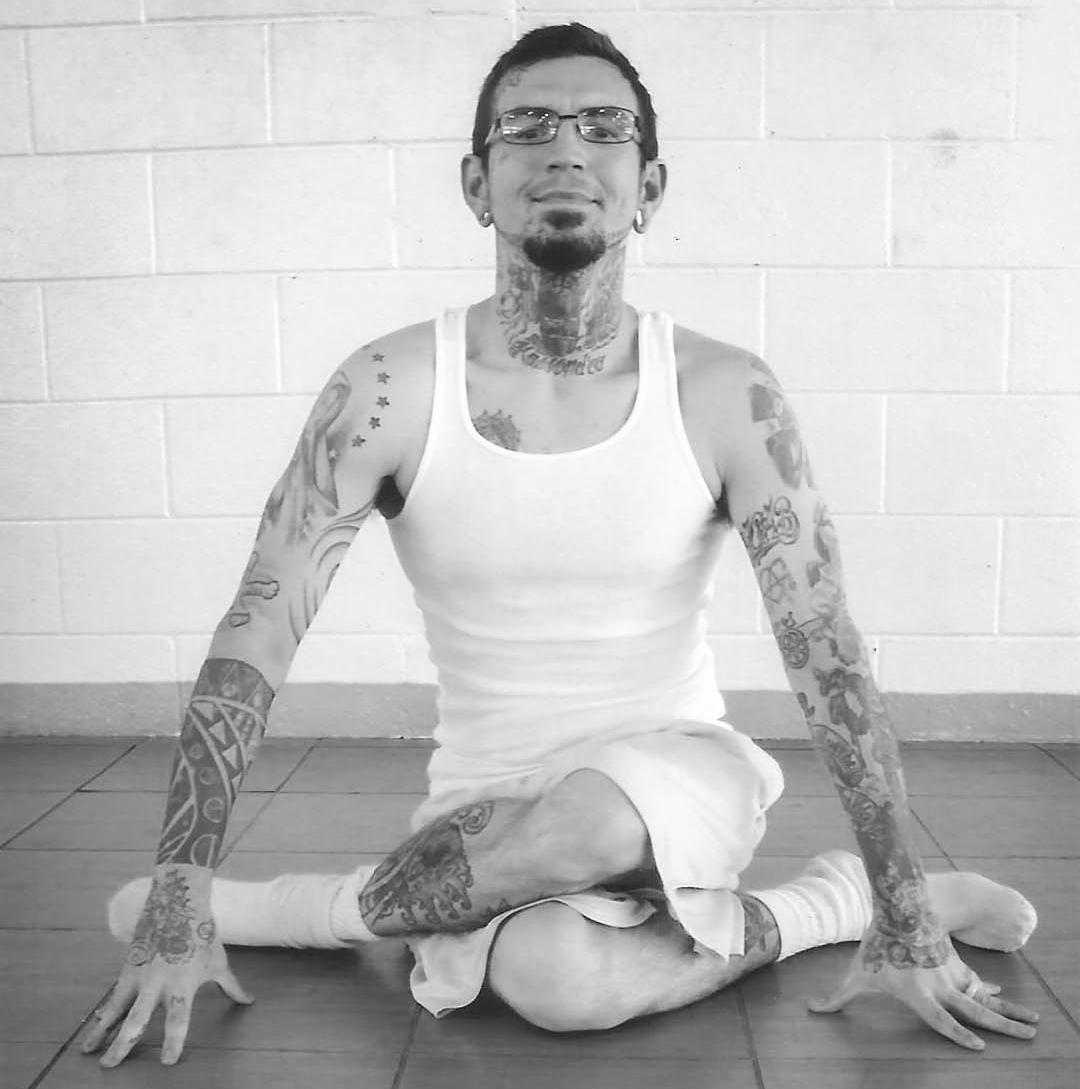
B&P: What is the relationship between your incarceration and your political education? How has the experience of being incarcerated changed how you think about the world?
EK: Prison has reaffirmed all my anarchist beliefs and helped teach me further about what oppression really is. Prison has shown me, just like Congress or insurance companies have shown me, that governments do not give a shit about marginalized people, that our come-up will be through solidarity and unity. I lived in a bubble, knowing racism, homo/transphobia existed and needed to be fought, but surrounding myself with like-minded people, having the privilege to encounter these things on my terms, at rallies or fights. Prison has introduced me to new levels of hate, bigotry and violence. It has taught me the fear I face in prison for being different politically, is similar to what folks feel like in their homes or communities and this is devastating.
B&P: What did your life look like day-to-day before COVID? What does it look like now?
EK: My life pre-COVID and post-COVID are not vastly different. I am in the SHU pending trial for “assaulting an officer,” I’ve been in this pre-trial SHU 16 months. COVID has caused burdens for all of us. They cut visits, including legal… so although I’ve got trial in 4 months, I’ve yet to meet my new legal team, although we are allowed a couple 15 minute legal calls per month… smh. They also decided to cut our food portions by a third, which is logical and definitely not the stupidest shit imaginable. For breakfast, bagged food. For lunch and dinner, styrofoam trays. It’s a farce. People back here with phone access decided to finally follow policy, so I’ve been getting my monthly one call, that’s been amazing.
The people in charge of the prisons are bad people, it’s important folks know this. They are pieces of shit who need to be publicly outed as enemies of the people. J.E. Krueger – Regional Director wouldn’t let tests be taken to keep numbers low. Put him (and his office) on blast! Now-retired Warden Greilick and his lackey Ms. Thomas ensured pre-trial prisoners have no access to their lawyers. Our “rights” are toilet paper to these bastards.
B&P: How important has it been to have people writing you while you are in prison?
EK: Letter writing is beautiful for a plethora of reasons, including showing the prison that we aren’t invisible, we are loved and supported. It also helps us to stay human, having real friendships in the world. That said, for prison support groups, or abolitionists, letter writing should never be the end-all. We need real support. We need phone-call ins, we need fundraisers for legal support or just so we can write you back or call our families. We need people to get our words out there, to spread awareness, we need books or magazines, we need people to look in on our families, to protest for us, to act in solidarity, to dox our torturers, to write about us, to keep us alive and vibrant out there. Support is support. Letter writing as a means to show kindness or build friendship on an individual basis is a beautiful thing, though; it’s a way to maintain reality and a sense of who we are as people, instead of “King 27090045.”
Much love to the FireAnt Collective, Rob, Nadiya, M. Kimble, J. Rose, S. Swan, Thomas, and all anarchist and revolutionaries inside. Comrades, we are together. Fight 2 win. Thank you 2 all those who fight 4 us: Certain Days, all the ABC and ABCFs, B&P, all those fighting for us.
Eric has new lawyers from the Civil Liberties Defense Center and you can support his legal defense efforts by donating at https://cldc.org/donate/. Please earmark your donation on the website”Eric King legal defense.”

